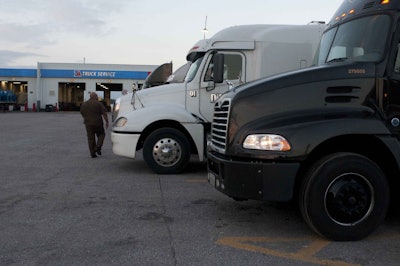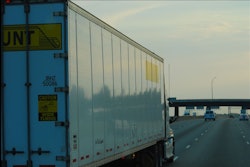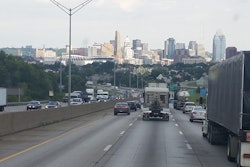
A court’s decision in California in recent history, however, with federal DOT’s blessing found that the state could enforce its meal and rest break labor rules for carriers there, widely applicable to both intrastate and interstate operations by some views. Such enforcement, sought by unions, is viewed by many, however, as a direct contradiction of the intent of FAAAA, which states a prohibition on a state or local government enacting or enforcing “laws or provisions that have the force and effect of law concerning price, route or service of motor carriers transporting property” in general.

The Denham amendment would restate such a prohibition but also turn it toward the issue of drivers’ hours specifically, with two central additions to the FAAAA text:
1) NEW LANGUAGE. ‘‘A State, political subdivision of a State, or political authority of 2 or more States may not enact or enforce a law, regulation, or other provision having the force and effect of law prohibiting employees whose hours of service are subject to regulation by the Secretary under section 31502 from working to the full extent permitted or at such times as permitted under such section, or imposing any additional obligations on motor carriers if such employees work to the full extent or at such times as permitted under such section, including any related activities regulated under part 395 of title 49, 7 Code of Federal Regulations.
2) NEW LANGUAGE. A State, political subdivision of a State, or political authority of 2 or more States may not enact or enforce a law, regulation, or other provision having the force and effect of law that requires a motor carrier that compensates employees on a piece-rate basis to pay those employees separate or additional compensation, provided that the motor carrier pays the employee a total sum that when divided by the total number of hours worked during the corresponding work period is equal to or greater than the applicable hourly minimum wage of the State, political subdivision of the State, or political authority of 2 or more States.”
In the interim since I wrote about it, I’ve heard the two provisions described in dire terms — some seem to want to characterize this as an attempt at “wage theft” from drivers.
The Owner-Operator Independent Drivers Association was somewhat more down to earth in their own call to action today, expressing opposition to the amendment nonetheless:
As lawmakers continue resolving the differences between the House and Senate versions of the Highway Bill this week in Washington, we would like to draw your attention to language that, if included, is certain to impact your bottom line. This language was introduced via amendment, by Congressman Jeff Denham (R-CA/10th), as a result of a 9th circuit court decision to enforce a 100 year old law in California pertaining to meal and rest breaks for employees. However, the language also includes an ambitious overreach that would limit the states’ ability to allow for any other driver compensation except mileage pay. OOIDA stands firmly opposed to this language.
The Denham amendment was passed by the House in early November by a 248-180 vote, but was not included in the Senate’s version of the highway bill. OOIDA needs you to speak out and oppose the Denham amendment because it would unravel mandated fair-pay for drivers and would empower large carriers to further reduce driver wages. It would also gut the ability for states to address critical items like payment for detention time, safety training and medical examinations or other costs associated with licensing procedures.
OOIDA’s opposition seems centered on the No. 2 provision noted above.
Driver and advocate Allen Smith of Ask the Trucker, too, issued his own, earlier “call to action” over the weekend to drivers oppose the amendment after this weekend’s edition of his and Donna Smith’s Ask the Trucker online radio show (you can listen to the relevant portion of that show via this link).
As OOIDA notes, what any state might mandate for drivers would apply in most borders only to employee drivers, not leased owner-operators (to the extent they’re not caught up in misclassification challenges, in any case, most common out West in the ports). And unlike some suggestions from drivers I’ve heard, nothing above in the language of the amendment precludes a carrier from offering detention or other accessorial pay, or even offering hourly pay, but rather it’s aimed at just what the state can make a carrier do beyond ensuring a basic (state) minimum wage over all hours worked.
At once, as OOIDA suggests, whether the second provision ultimately might encourage carriers who would abuse intrastate drivers long-term by not offering such accessorials or alternatives to traditional mileage/percentage schemes is an open question.
Amid all the opposition, I reached back to former owner-operator Joe Rajkovacz of the Western States Trucking Association, whose thoughts on this I heard a little of before the amendment was introduced during the National Association of Small Trucking Companies’ annual event. Rajkovacz looks back to the 1994 FAAAA in his further thoughts on the amendment:
“At the time Congress did intend that states completely remove themselves from regulating anything to do with intrastate trucking (except safety issues – authority, inspections, etc.). The federal courts upheld that will of Congress in numerous lawsuits until the last couple of years, where they’ve decided to ignore precedent and re-interpret Congressional intent, thus allowing states to begin stuffing their nose back into regulating certain facets of the industry. The whole point of the Denham amendment is to reassert federal preemption over states shoving their nose into this realm.”
Rajkovacz views the amendment as a “message to federal courts who have decided they know better than the Congress of the U.S.”
He does allow that “there are certainly many who believe states should be able to regulate their ‘intrastate’ markets. We have many members who would like to go back to the PUC (Public Utilities Commission) days of regulation. If we are to move back toward regulation of intrastate markets,” he adds that he believes it “must be done uniformly – not ‘piecemeal,’ as is being attempted right now.”
He views what is happening now, with incremental encroachments on how carriers do business state to state, as adding legal complication to how small-business owners might approach driver pay, for instance — where incentive-type percentage programs or mileage pay have long been very common — as they grow. Rajkovacz believes the California rulings and filed lawsuits over meal and rest-break rules amount to “attacks” on independent “owner-operators and small businesses wishing to grow…, which is exactly the desire of organized labor.”
What do you think? As I noted (and OOIDA notes), there is no such provision in the Senate version of the long-term highway bill, otherwise known as the Drive Act. Here’s a link to the amendment language in the House version. There’s no definite surety the amendment will survive the conference at this point or not.
Keep tuned as the conference between House and Senate continues (and it may continue beyond the Nov. 20 deadline if another short-term funding provision goes into effect as details are worked out); we’ll have news on all this as it occurs.
Podcast: Play in new window | Download











